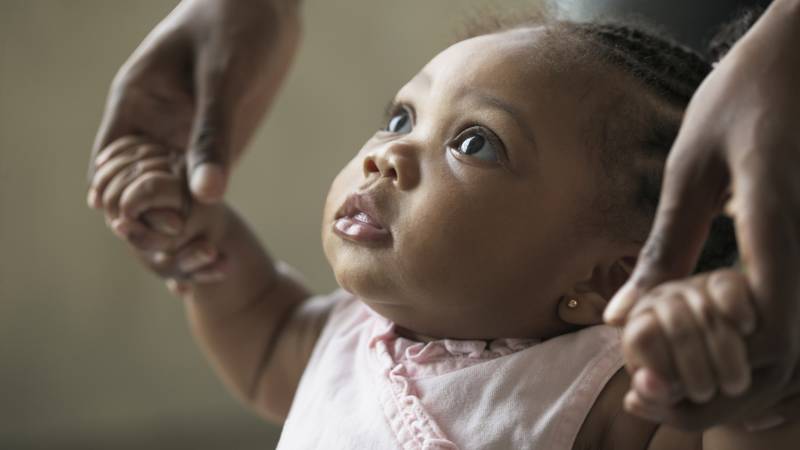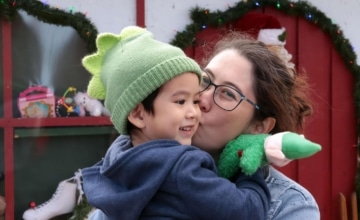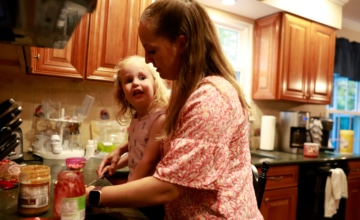Federal and state policymakers can strengthen the foundation being built for infants and toddlers by improving the continuum of services for the promotion and prevention of infant and early childhood mental health problems.
The healthy growth and development of a young child is much like the construction of a strong and stable building. When it comes to infant and toddler development, the neural pathways and connections literally shape the physical architecture of the developing brain, forming the strong foundation on which everything else is built. Social and emotional development is an integral part of the foundation that helps guide a young child into adulthood and is firmly tied to every other area of development—physical growth and health, communication and language development, cognitive skills, and early relationships.
1 in 5 children has a diagnosable mental disorder, but factors that predict mental health problems can be identified in the early years.
Early childhood social and emotional development is influenced by biology, environment, and relationships that exist between a small group of consistent caregivers and a child. Because the parent-child relationship is so critical for early development, the mental wellness of adults plays a critical role in how very young children develop. When an infant or toddler’s social and emotional development suffers significantly, they can, and do, experience mental health problems as well. But skilled providers can accurately screen, diagnose, and treat mental health disorders in infancy and early childhood before they impact other areas of development. Federal and state policymakers can strengthen the foundation being built for infants and toddlers by improving the continuum of services for the promotion and prevention of infant and early childhood mental health problems, as well as the provision of early intervention services for at-risk infants and toddlers.
What Does “Social and Emotional Development” Mean?
Healthy social and emotional development refers to a child’s capacity to experience, manage, and express a full range of positive and negative emotions; develop close, satisfying relationships with others; and actively explore environments and learn. Professionals in the field of child development who focus on social and emotional development refer to their area of practice as “infant mental health” or “early childhood mental health.”
Policy Recommendations
1. Create or expand initiatives that integrate comprehensive infant and early childhood mental health services into child-serving settings.
Early childhood mental health screenings, services, training, and supports that promote healthy social-emotional development may be provided in a variety of settings—at home, in a child care setting, in a primary health care facility, or in a mental health professional’s office. It is critical that training for staff, parents, and other caregivers on how best to support healthy social-emotional development, as well as screenings and services, are integrated into existing programs that reach infants and toddlers in these different settings. For example, with mental health consultation and training in child care centers, staff can support social and emotional development, prevent behavioral problems, support relationships with families, and identify early warning signs of mental health disorders. Federal and state policymakers should increase funding for services that promote social-emotional health and well-being in young children, as well as prevention services for children and families experiencing, or at high risk of experiencing, situations that might lead to disruptions in social-emotional development. This includes expanding the capacity of federal programs such as Medicaid, Head Start and Early Head Start, Parts B and C of the Individuals With Disabilities Education Act (IDEA), the Child Care and Development Fund (CCDF), and the Maternal and Child Health Block Grant to support early childhood social and emotional development.
75% to 80% of children and youth in need of mental health services do not receive them.
2. Strengthen the capacity of the mental health system to diagnose and treat infants and toddlers.
Across the country, mental health systems are focusing greater attention on children’s mental health, but the services provided are mainly designed for older children. It is critically important that the programs and systems that support mental health services recognize and respond to the unique needs of infants and toddlers who experience mental health problems. Identifying and diagnosing early mental health problems is challenging and is compounded by the lack of skilled practitioners to diagnose and treat infants, toddlers, and their families. Untreated infant mental health disorders can have disastrous effects on children’s functioning and future outcomes. Hence, training, technical assistance, and supervision for clinicians is vital to building capacity and expertise in infant mental health. These components ensure high-quality assessments, consultation, and intervention. Federal and state policymakers should support efforts to expand the number of mental health clinicians who are trained to specifically address infant and early childhood mental health issues by including infant and early childhood mental health in professional development initiatives, developing competencies and credentialing or endorsement systems for early childhood mental health clinicians, and supporting special training projects or programs at colleges and universities.
3. Improve access to parental mental health services that treat maternal depression, anxiety disorders, substance abuse, and family violence.
The emotional wellness of parents plays a major role in the mental health of their children. Parents with positive mental health are better able to foster a healthy parent-child relationship than those with mental health disturbances. The absence of a healthy, strong emotional bond between parent and child poses a great risk to a child’s development. Adult mental health disturbances, such as maternal depression and substance abuse, disrupt parenting and interfere with their ability and availability to nurture a child’s social and emotional development. Improving parental mental health improves both child and adult outcomes. State and federal policymakers should improve access to parental mental health services that treat maternal depression, anxiety disorders, substance abuse, and family violence.
4. Provide funding for states to implement requirements to refer infants and toddlers with substantiated cases of abuse and neglect to Part C of the IDEA.
Infants and toddlers who have been maltreated and who may be in foster care represent a group of children who are extremely vulnerable to mental health problems. Many have been seriously maltreated, which often results in failure to thrive and the exhibition of behavior problems, such as tantrums, self-endangering, aggression, and inability to be consoled. Infants and toddlers who have suffered physical or sexual abuse, neglect, and separation from their parents may also suffer emotional and developmental consequences unless they, and their parents, foster parents, and other primary caregivers are provided with supportive mental health interventions. Congress recognized this need in reauthorizing the Child Abuse Prevention and Treatment Act (CAPTA) and IDEA, requiring infants and toddlers with substantiated cases of abuse or neglect be referred for Part C early intervention services. However, states have had problems implementing this requirement because of lack of funding.7 Policymakers should provide funding for states to implement the CAPTA and IDEA mandates for referral to Part C early intervention services for children under 3 who are involved in a substantiated case of child abuse and neglect.
Starting at birth, babies can show signs of depression, including inconsolable crying, slow growth, and sleep problems.
5. Expand resources for parents and early childhood professionals on early social and emotional development, in order to advance evidence-based practices in infant and early childhood mental health.
Parents and caregivers need informational resources to help them understand the importance of social and emotional development in the earliest years. Readily accessible materials for parents help them support their babies’ development. In addition, although new research and some promising models for addressing infant mental health concerns are available, parents and professionals are largely unaware of such information. Early childhood programs frequently see infants and toddlers with mental health needs, but staff have no central place to go for information and assistance. Federal and state policymakers should increase the visibility of early social and emotional development by creating educational materials on the subject and providing information, technical assistance, training, and other resources to parents and early childhood professionals.
Case Study: Military Families Support Their Babies
For American military families, the social and emotional health of their young children is tied directly to the unique issues they face as a family. Deployment, loss, grief, and stress all present challenges and opportunities for military parents as they support the mental health of their young children.
Julie and Matthew Smith are a military couple who faced the trauma of a seven-month deployment early on in Julie’s pregnancy. While Matthew was deployed, Julie found out she was pregnant with twins and went through a very difficult pregnancy that resulted in the premature birth of her babies. Matthew missed the birth of his children and was not able to be home while they spent weeks in the neonatal intensive care unit (NICU) and then came home with a range of medical needs. Julie rose to the challenge as a “single” mom with the help of her mother and community resources, such as a military spouses support group and Early Head Start. When her husband finally returned home, the babies were already 3 months old. As a family, they worked hard to address Matthew’s transition back home, ensuring he had time to bond with the babies. When the babies were 9 months old, Matthew was deployed once again for another year, and the family had to deal with another long separation.
Parents with positive mental health are better able to foster a healthy parent-child relationship than those with mental health disturbances.
Despite the hardships of separation and deployment, the Smith family is resilient, and the social and emotional health of the twins is sound. For military families with young children, the partnership between parents, programs, and policies can make all the difference in their healthy social and emotional development.
Research
Untreated mental health disorders can have detrimental effects on children’s functioning and future outcomes. Unlike adults, babies and toddlers have a fairly limited repertoire of responses to stress and trauma. Mental health disorders in infants and toddlers might be reflected in physical symptoms (poor weight gain, slow growth, and constipation), overall delayed development, inconsolable crying, sleep problems, or aggressive or impulsive behavior and paralyzing fears. Early attachment disorders (including those resulting from early traumatic separations from parents and placement in foster care) predict subsequent aggressive behavior. Some early mental health disorders have lasting effects and may appear to be precursors of mental health problems in later life, including withdrawal, sleeplessness, or lack of appetite due to depression, anxiety, and traumatic stress reactions.
Healthy social-emotional development is strongly linked to success in elementary school. The emotional, social, and behavioral competence of young children is a strong predictor of academic performance in elementary school. Social and emotional development is just as important as literacy, language, and number skills in helping young children prepare for school. Those children who are not secure in relating to others are not able to trust adults and, as a result, are not motivated to learn. Furthermore, school-age children who cannot calm themselves or be calmed enough to respond to teaching may not benefit from early educational experiences and will fall behind their peers.
The mental health of parents can affect young children. Maternal depression, anxiety disorders, and other forms of chronic depression affect approximately 10% of mothers with young children. These conditions often disrupt the parent-child bond as parents with mental disorders are less able to provide developmentally appropriate stimulation and parent-child interactions. Parenting and child development are most affected when depression simultaneously occurs with other factors (extreme poverty, substance abuse, adolescence, maltreatment, etc.). Infants of clinically depressed mothers often withdraw from caregivers, which ultimately affects their language skills, as well as their physical and cognitive development. Older children of depressed mothers show poor self-control, aggression, poor peer relationships, and difficulty in school.
Increased training in infant and early childhood mental health is necessary. The lack of a skilled workforce—the professionals needed to conduct the screening, diagnosis, and treatment of mental health problems in very young children—is a major barrier to implementing effective services. Working with young children requires in-depth knowledge of child development systems approaches and diagnostic and clinical skills, as well as multidisciplinary approaches to practicing in the field. When reviewing these criteria, it is evident that there are not nearly enough infant mental health specialists to meet existing needs. In fact, in a 2002 survey in Illinois, 62% of programs reported inadequate mental health resources. Increased training has proven to have a positive impact on programs as evidenced by an evaluation of a California early mental health training program which found that the “new skills and knowledge of the clinicians participating in the mental health training were influencing others [in the community agencies] because the [participating clinicians were] better able to help the agency make decisions about some of the difficult social service issues such as reunification and visitation.”
For citations, download the full policy guide.




